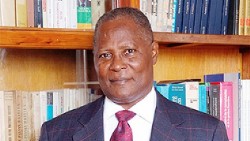by Jacqueline Charles. Originally posted at the Miami Herald
 The former head of Haiti’s Senate and National Assembly was elected the country’s interim president Sunday after a vote that went to a second round and took nearly 12 hours.
The former head of Haiti’s Senate and National Assembly was elected the country’s interim president Sunday after a vote that went to a second round and took nearly 12 hours.
Jocelerme Privert, 62, beat out two other candidates — both were former Senate presidents as well — to lead a 120-day provisional government charged with organizing Haiti’s twice postponed presidential and partial legislative runoffs.
His historic election is part of an accord that hopes to address the constitutional and institutional crises created by former President Michel Martelly’s departure from office. Martelly left office a week ago Sunday without an elected successor because of the disputed Oct. 25 presidential first round.
Opposition parties and local watchdog groups have been insistent that the vote was marred by “massive” fraud in favor of Martelly’s handpicked successor, Jovenel Moïse. A relatively unknown serial entrepreneur who goes by the moniker “Banana Man,” Moïse, has denied the allegations.
Still, the allegations have triggered violent street protests, calls for a vote verification and a boycott by opposition presidential candidate Jude Célestin . Célestin qualified for the runoff against Moïse but said he will not participate in a second round until, among other things, the recommendations of an electoral commission charged with evaluating the vote are applied.
Although Privert has more than 30 years in the public service — he once headed the Haitian equivalent of the Internal Revenue Service — he faces a daunting task. As president, one of his first priorities will be to select a consensus prime minister in the coming days.
Sunday’s vote marks the first time since 1946 that parliament intervened to elect the head of state. Their role, however, has come under heavy criticism even from opposition groups represented in both chambers. One senator, former presidential candidate Steven Benoit, who advocated tapping a judge from the Supreme Court to serve as interim president, was so opposed to parliament’ s involvement in the the process that he boycotted the session.
Privert’s presidential win came came after 12 hours of debate, improvisation and discussions in the parliament over how to proceed with the historic vote. Some publicly opposed his candidacy because as Senate president, he had led the negotiations with Martelly that produced the last-minute deal outlining the steps for the installation of a provisional government.
Parliament, critics argued, cannot be “judge and party.” The debate continued in the parliament where some asked Privert to note vote even though he had the right as a sitting senator. He ignored the requests and twice voted for himself .
Growing increasingly impatient with the marathon discussions, newly elected Sen. Dieupie Cherubin at one point told the room: “The country is waiting on us to give it a president.”
Some are hoping that Privert’s elections and opposition ties — he served as interior minister under former President Jean-Bertrand Aristide and as a senator under two of René Préval’s political party banners — will help calm the streets. For months, demonstrators have been taking to the streets in systematic and often violent protests to demand greater scrutiny of the vote.
Even with Martelly’s departure, the protests have continued.
“We are in very difficult situation,” Sen Jean Baptiste Bien-Aime told his fellow lawmakers during the debate. The current crisis, he said, risks plunging Haiti into “a political tsunami.”
Sunday’s vote marks the first time since 1946 that parliament intervened to elect the head of state. Their role, however, has come under heavy criticism even from opposition groups represented in both chambers.
Initially 13 people applied for the job. The list was reduced to three: Privert and former senators and head of the National Assembly Edgard Fils Leblanc and Dejean Belizaire. The contest, however, was really between Privert and Leblanc, who despite his opposition roots, had the backing of Martelly’s Haitian Tèt Kale Party supporters.
Leblanc served in the Senate in the mid-1990s as a member of the Organization of the People in Struggle (OPL) party, which at the time, dominated the parliament in the midst of another political crisis over disputed elections.
An initial vote did not produce a winner. Instead, Privert led the Senate but had lost the Lower of Chamber of Deputies to Leblanc after members placed their secret hand-written scrap of paper in separate urns decorated with the Haitian flag. After discussions and negotiations, a second vote was held.
Privert finished with a combined 77 votes to Leblanc’s 33. Belizaire, who had no votes in the first round, finished with two.
At 3:35 a.m. Cholzer Chancy, the president of the lower chamber, declared Privert, “the provisional president of the Republic of Haiti.”
Moments later, Privert put on the traditional black hat worn by the president of National Assembly, and handed over his resignation letter from the Senate. He then removed the hat, raised his right hand toward the sky and promised to uphold the constitution and “respect the rights of the Haitian people.”
The presidential sash was then placed around him.
While elections remain a top priority, Haiti is facing the worst food and drought crisis in 15 years, which must be addressed. Last week, the country’s second largest city Cap-Haitien was hit by terrible floods.
Addressing the assembly prior to the vote, Privert pointed out his three-decades plus experience in the public sector, telling lawmakers that one of his goals as president would be to quickly bring legitimacy to the country’s institutions.
